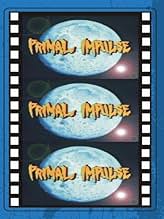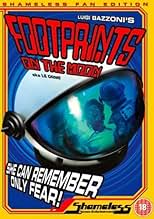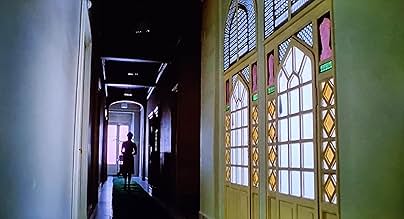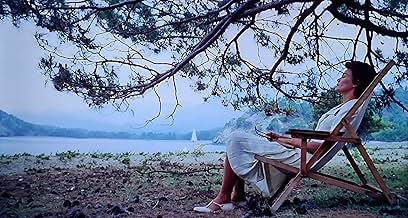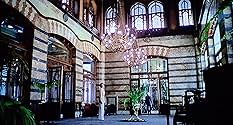PUNTUACIÓN EN IMDb
6,6/10
2,7 mil
TU PUNTUACIÓN
Añade un argumento en tu idiomaAfter being tormented by dreams about astronauts on the moon, a translator visits a deserted seaside town whose inhabitants know her, although she does not know them.After being tormented by dreams about astronauts on the moon, a translator visits a deserted seaside town whose inhabitants know her, although she does not know them.After being tormented by dreams about astronauts on the moon, a translator visits a deserted seaside town whose inhabitants know her, although she does not know them.
- Dirección
- Guión
- Reparto principal
John Karlsen
- Alfredo Laurenti
- (as John Carlsen)
- …
Miriam Acevedo
- Alice's Supervisor
- (as Myriam Acevedo)
Rosita Torosh
- Marie Leblanche
- (as Rosita Toros)
Bruno Degni
- Member of the International Congress
- (sin acreditar)
Franco Magno
- Member of the International Congress
- (sin acreditar)
Lidia Zanussi
- Member of the International Congress
- (sin acreditar)
Luciano Zanussi
- Member of the International Congress
- (sin acreditar)
Feridun Çölgeçen
- Hotel Concierge
- (sin acreditar)
Reseñas destacadas
Alice (Florinda Bolkan), a translator living in Italy, discovers that she has a memory loss and can't recall the last couple of days. She starts to follow a trace of memory fragments, which leads her to the small town of Garma. People in the town seem to recognize her and she's beginning to suspect that the re-occurring nightmares of astronauts conducting horrible experiments has something to do with her own amnesia.
The movie is interesting and the plot is good, but it's a bit to slow moving and arty for my taste. The plot takes some nice twists and it's really hard to figure out where it's heading. Florinda Bolkan is good in her role (but even better in "Flavia the Heretic") and it's always nice to see "star" child actor Nocoletta Elmi. Klaus Kinski's role is too small though. This is not a movie for the die-hard gore hound or exploitation addict, but still a very nice hour-and-a-half mystery.
The movie is interesting and the plot is good, but it's a bit to slow moving and arty for my taste. The plot takes some nice twists and it's really hard to figure out where it's heading. Florinda Bolkan is good in her role (but even better in "Flavia the Heretic") and it's always nice to see "star" child actor Nocoletta Elmi. Klaus Kinski's role is too small though. This is not a movie for the die-hard gore hound or exploitation addict, but still a very nice hour-and-a-half mystery.
I first heard of this one while searching the 'Net for reviews of another Italian giallo/horror effort, the contemporaneous THE PERFUME OF THE LADY IN BLACK (1974; whose R2 SE DVD from Raro Video, by the way, I recently acquired) where it's referenced as being in a similar vein but also just as good. Having watched FOOTSTEPS for myself now, I can see where that reviewer was coming from in that both films deal with the psychological meltdown of their female protagonist. Stylistically, however, this one owes far more to Art-house cinema than anything else in particular, the work of Alain Resnais and Michelangelo Antonioni (and, specifically, LAST YEAR IN MARIENBAD [1961] and THE PASSENGER [1975] respectively); accordingly, some have accused it of being "deadly boring" an epithet often attached to such 'pretentious' (read: cerebral) fare!
Anyway, the film involves the quest of a woman (Florinda Bolkan) to determine her movements in the preceding three days of which she seems to have no recollection. Following a series of cryptic clues, she travels to the 'mythical' land of Garma (nearby locations, then, bear the equally fictitious names of Muda and Rheember) where she encounters several people (including Lila Kedrova as an aristocratic regular of the resort) who ostensibly recall the heroine staying there during her 'blackout'! Most prominent, though, are a young man (Peter McEnery) and a little girl (Nicoletta Elmi, from Mario Bava's BARON BLOOD [1972]) the former always seems to happen on the scene at propitious moments, while the latter apparently confuses Bolkan with another woman (sporting long red hair and a mean streak!).
While essentially a mood piece, this is nonetheless a gripping puzzle: inevitably, vague events transpire at a deliberate pace and where much of the film's power derives from the remarkable central performance (which can be seen as an extension of Bolkan's role in the fine Lucio Fulci giallo A LIZARD IN A WOMAN'S SKIN [1971]). However, there's no denying the contribution of cinematographer Vittorio Storaro (who provides any number of sweeping camera moves and an effective color scheme adopting orange/red/blue filters to create atmosphere and coming up with a saturated look for the disorientating, bizarre finale) and Nicola Piovani's fitting melancholy score (the composer is best-known nowadays for his Oscar-winning work on Roberto Benigni's Holocaust-themed tragi-comedy LIFE IS BEAUTIFUL [1997]).
With this in mind, it's worth discussing how FOOTSTEPS was presented in the version I watched: well, being apparently hard-to-get in its original form (I can't be sure whether it's uncut here or not, except to say that the film ran for 89 minutes while the IMDb lists it at 96), this edition is culled from a fairly battered English-language VHS (the dubbing is surprisingly good, given the international cast) with burnt-in Swedish subtitles to boot (besides, the DivX copy froze for a few seconds at a crucial point in the story around the 82-minute mark)! Still, we do get a welcome bonus i.e. a 9-minute 'Highlights From The Soundtrack' in MP3 format.
I realize I haven't yet mentioned the moon mission subplot, to which Klaus Kinski's presence is restricted: incidentally, around this same time, he had a similarly brief but pivotal role in another good arty thriller with sci-fi leanings (and also set in a distinctive location) namely, LIFESPAN (1974). As I lay watching the film, I couldn't fathom what possible connection this had with the central plot except that Bolkan mentioned a recurring dream about a movie she had once seen, though not through to the end, called "Footsteps On The Moon" (a somewhat misleading alternate title for the film itself) amusingly, she at first recalls the picture as being called BLOOD ON THE MOON (which, of course, is a classic 1948 Western noir with Robert Mitchum and directed by Robert Wise!). That said, I took this 'diversion' in stride as merely one more outlandish touch to the film (given also Bolkan's former employment as a translator at a conference discussing Earth's future) and certainly didn't expect the astronauts to turn up on Garma's beach at the very end to pursue the female lead, where the sand then turns ominously into the moon's surface !
The film's plot will probably make more sense on a second viewing though, to be honest, this is best approached as a visual/aural experience and one shouldn't really expect it to deliver a narrative that's in any way clear-cut and easily rationalized! For the record, the only other Bazzoni effort I'd managed to catch prior to this one was the middling straight giallo THE FIFTH CORD (1971), starring Franco Nero (which I had recorded off late-night Italian TV); some time ago, I did get hold of his Spaghetti Western rendition of "Carmen" titled MAN, PRIDE AND VENGEANCE (1968) also with Nero and Kinski as a DivX (after I'd already missed a matinée broadcast of it) but the conversion had somehow proved faulty and, consequently, the disc wouldn't play properly!
Anyway, the film involves the quest of a woman (Florinda Bolkan) to determine her movements in the preceding three days of which she seems to have no recollection. Following a series of cryptic clues, she travels to the 'mythical' land of Garma (nearby locations, then, bear the equally fictitious names of Muda and Rheember) where she encounters several people (including Lila Kedrova as an aristocratic regular of the resort) who ostensibly recall the heroine staying there during her 'blackout'! Most prominent, though, are a young man (Peter McEnery) and a little girl (Nicoletta Elmi, from Mario Bava's BARON BLOOD [1972]) the former always seems to happen on the scene at propitious moments, while the latter apparently confuses Bolkan with another woman (sporting long red hair and a mean streak!).
While essentially a mood piece, this is nonetheless a gripping puzzle: inevitably, vague events transpire at a deliberate pace and where much of the film's power derives from the remarkable central performance (which can be seen as an extension of Bolkan's role in the fine Lucio Fulci giallo A LIZARD IN A WOMAN'S SKIN [1971]). However, there's no denying the contribution of cinematographer Vittorio Storaro (who provides any number of sweeping camera moves and an effective color scheme adopting orange/red/blue filters to create atmosphere and coming up with a saturated look for the disorientating, bizarre finale) and Nicola Piovani's fitting melancholy score (the composer is best-known nowadays for his Oscar-winning work on Roberto Benigni's Holocaust-themed tragi-comedy LIFE IS BEAUTIFUL [1997]).
With this in mind, it's worth discussing how FOOTSTEPS was presented in the version I watched: well, being apparently hard-to-get in its original form (I can't be sure whether it's uncut here or not, except to say that the film ran for 89 minutes while the IMDb lists it at 96), this edition is culled from a fairly battered English-language VHS (the dubbing is surprisingly good, given the international cast) with burnt-in Swedish subtitles to boot (besides, the DivX copy froze for a few seconds at a crucial point in the story around the 82-minute mark)! Still, we do get a welcome bonus i.e. a 9-minute 'Highlights From The Soundtrack' in MP3 format.
I realize I haven't yet mentioned the moon mission subplot, to which Klaus Kinski's presence is restricted: incidentally, around this same time, he had a similarly brief but pivotal role in another good arty thriller with sci-fi leanings (and also set in a distinctive location) namely, LIFESPAN (1974). As I lay watching the film, I couldn't fathom what possible connection this had with the central plot except that Bolkan mentioned a recurring dream about a movie she had once seen, though not through to the end, called "Footsteps On The Moon" (a somewhat misleading alternate title for the film itself) amusingly, she at first recalls the picture as being called BLOOD ON THE MOON (which, of course, is a classic 1948 Western noir with Robert Mitchum and directed by Robert Wise!). That said, I took this 'diversion' in stride as merely one more outlandish touch to the film (given also Bolkan's former employment as a translator at a conference discussing Earth's future) and certainly didn't expect the astronauts to turn up on Garma's beach at the very end to pursue the female lead, where the sand then turns ominously into the moon's surface !
The film's plot will probably make more sense on a second viewing though, to be honest, this is best approached as a visual/aural experience and one shouldn't really expect it to deliver a narrative that's in any way clear-cut and easily rationalized! For the record, the only other Bazzoni effort I'd managed to catch prior to this one was the middling straight giallo THE FIFTH CORD (1971), starring Franco Nero (which I had recorded off late-night Italian TV); some time ago, I did get hold of his Spaghetti Western rendition of "Carmen" titled MAN, PRIDE AND VENGEANCE (1968) also with Nero and Kinski as a DivX (after I'd already missed a matinée broadcast of it) but the conversion had somehow proved faulty and, consequently, the disc wouldn't play properly!
Unable to cope with mounting pressures at work and haunted by visions of a lone astronaut abandoned on the surface of the moon, Alice travels to the exotic sea side town of Garma to get away from it all.
She encounters a number of people there who claim to know her from earlier as Nicole, even though she insists this is her first time there. Brazillian born Florinda Bolkan turns in a solid performance as the elusive Portugese translator caught in the grips of a fugue.
A strange but oddly compelling existential mystery about dual identities and self-fulfilling prophecies, Footprints on the moon is more reminiscent of art-house favorites such as Antonioni's L'aventura and Passenger and Resnais' Last Year at Marienbad, than say other Mystery/Thriller Genre fare so popular at the time in Italy.
The story unfolds at a languorous pace and things get redundant after a while, but it does allow Cinematographer extraordinaire Vittorio Storaro to really explore the unique locations and dazzle with his wonderfully dexterous camera-work. He furthers the style he pioneered in The Conformist.
Also, watch out for Klaus Kinski in a small role as a sinister Space Commander on the lookout for guinea pigs to conduct his secret experiments for a shadowy Government agency. Yes, I'm talking about the same movie.
She encounters a number of people there who claim to know her from earlier as Nicole, even though she insists this is her first time there. Brazillian born Florinda Bolkan turns in a solid performance as the elusive Portugese translator caught in the grips of a fugue.
A strange but oddly compelling existential mystery about dual identities and self-fulfilling prophecies, Footprints on the moon is more reminiscent of art-house favorites such as Antonioni's L'aventura and Passenger and Resnais' Last Year at Marienbad, than say other Mystery/Thriller Genre fare so popular at the time in Italy.
The story unfolds at a languorous pace and things get redundant after a while, but it does allow Cinematographer extraordinaire Vittorio Storaro to really explore the unique locations and dazzle with his wonderfully dexterous camera-work. He furthers the style he pioneered in The Conformist.
Also, watch out for Klaus Kinski in a small role as a sinister Space Commander on the lookout for guinea pigs to conduct his secret experiments for a shadowy Government agency. Yes, I'm talking about the same movie.
A slow-moving film which retains a certain cult ; it seems it's all in a dream ,or a nightmare more like ; few special effects,no gore, but a great sense of mystery,with an open ending which will make all viewers interpreting the meaning of this bewildering story according to their own sensitivity .
With its deja vu feeling, its bizarre characters (Lila Kedrova) , its strange experiments on the moon , one can wonder whether the heroine is losing her mind, or is it a recurrent nightmare ? Its atmosphere sometimes recall "carnival of souls" ,probably the first important indie in the history of cinema .The beauty of Florinda Bolkan and the threatening face of Klaus Kinski add to the fascinating and deadly charm of this offbeat work.
With its deja vu feeling, its bizarre characters (Lila Kedrova) , its strange experiments on the moon , one can wonder whether the heroine is losing her mind, or is it a recurrent nightmare ? Its atmosphere sometimes recall "carnival of souls" ,probably the first important indie in the history of cinema .The beauty of Florinda Bolkan and the threatening face of Klaus Kinski add to the fascinating and deadly charm of this offbeat work.
I consider this a missed opportunity. I have very fond memories of the filmmaker's debut, an interesting psychosexual oddity called La Donna Del Lago, and watching this I'm inclined to think that earlier film worked so well because the giallo had not been mapped down yet; so he was free to travel where it was novel at the time. Polanski got there that same year, but he was already a name and had Deneuve with him and so made the bigger splash. Film history has noted Repulsion.
This could have been even better. He has brought ambitious imagination with him, a visual palette of bright golden hues and relaxing blues, a sense of place and folded mysterious time with memory from Marienbad. He has Vittorio Storaro's eye behind the lens.
The opening is more than promising. A woman wakes up with no memory of three days past. She has just seen a dream, a feverish vision of astronauts staggering on blasted moonscapes, which she remembers is from a movie called the same as the one we're watching; but a movie she left without watching the ending. She goes to Italy to investigate, in an effort to bring these images into focus.
There it falls apart, in Italy incidentally. In the ten years since that first film that was in some ways a giallo ancestor the genre had come and was already on its way out. Between these two films Bazzoni had worked where it was the trend in the Italian industry, making a western and another giallo called The Fifth Chord. So when the more ambitious material for this came together, there were already footsteps he was expected to walk and had been trained to. The circumstances of a commercial movie industry were just so.
So for the middle part of the film we get a giallo worked from convention. The convoluted plot where each character withholds crucial information until the time is right, and the protagonist has to cobble together a puzzle from clues and red herrings. Much ado.
It comes full circle in the finale; the agents which she has imagined to be controlling her illusion return to pull her back into the fiction of the dream. It happens with extraordinary images of a stretch of empty cosmic beachside.
Bazzoni never made another film after this. In the meantime, Polanski had rocketed into Hollywood orbit and was already on his way out. I reckon that Bazzoni was one of our sad losses, but alas he never made it to France where money didn't always expect to fill a double-bill.
This could have been even better. He has brought ambitious imagination with him, a visual palette of bright golden hues and relaxing blues, a sense of place and folded mysterious time with memory from Marienbad. He has Vittorio Storaro's eye behind the lens.
The opening is more than promising. A woman wakes up with no memory of three days past. She has just seen a dream, a feverish vision of astronauts staggering on blasted moonscapes, which she remembers is from a movie called the same as the one we're watching; but a movie she left without watching the ending. She goes to Italy to investigate, in an effort to bring these images into focus.
There it falls apart, in Italy incidentally. In the ten years since that first film that was in some ways a giallo ancestor the genre had come and was already on its way out. Between these two films Bazzoni had worked where it was the trend in the Italian industry, making a western and another giallo called The Fifth Chord. So when the more ambitious material for this came together, there were already footsteps he was expected to walk and had been trained to. The circumstances of a commercial movie industry were just so.
So for the middle part of the film we get a giallo worked from convention. The convoluted plot where each character withholds crucial information until the time is right, and the protagonist has to cobble together a puzzle from clues and red herrings. Much ado.
It comes full circle in the finale; the agents which she has imagined to be controlling her illusion return to pull her back into the fiction of the dream. It happens with extraordinary images of a stretch of empty cosmic beachside.
Bazzoni never made another film after this. In the meantime, Polanski had rocketed into Hollywood orbit and was already on his way out. I reckon that Bazzoni was one of our sad losses, but alas he never made it to France where money didn't always expect to fill a double-bill.
¿Sabías que...?
- CuriosidadesOn Mill Creek's 50 movies set "Sci-Fi Invasion", the movie is available under its alternate title "Primal Impulse".
- PifiasCrew member visible reflected in mirror when Alice wakes up in the Peacock Room.
- Citas
Alice Campos: I'm not crazy!
Selecciones populares
Inicia sesión para calificar y añadir a tu lista para recibir recomendaciones personalizadas
- How long is Footprints on the Moon?Con tecnología de Alexa
Detalles
- Duración1 hora 36 minutos
- Mezcla de sonido
- Relación de aspecto
- 1.85 : 1
Contribuir a esta página
Sugerir un cambio o añadir el contenido que falta

Principal laguna de datos
By what name was Huellas de pisadas en la luna (1975) officially released in India in English?
Responde

